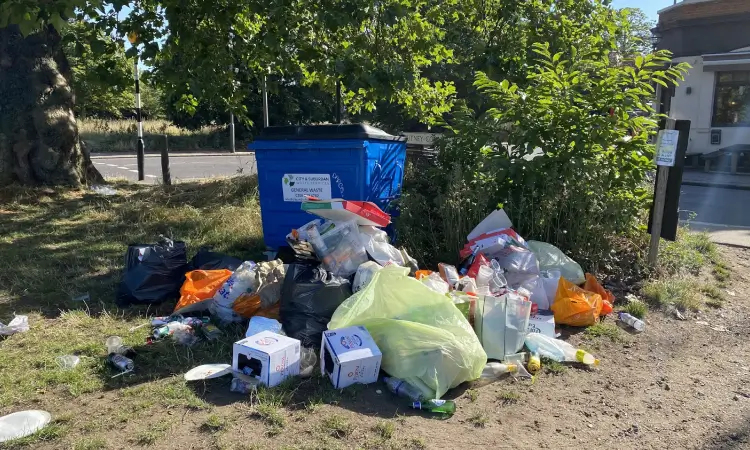Trash cans are an essential part of daily living, but they are often forgotten when it comes to routine cleaning and upkeep. Many individuals are unaware that trash cans can contain harmful bacteria that cause significant health risks. This article will look at the different forms of bacteria that are typically found inside of a trash can, the health risks they represent, and why professional cleaning services are necessary for keeping a healthy and safe environment.
Introduction
Trash cans are essential for trash management, but they often need to be more unnoticeable in terms of cleanliness. This neglect might result in the gathering of hazardous bacteria, which can harm our health. Understanding the risks hidden in dirty garbage cans, as well as the benefits of expert cleaning services, can help you maintain a healthier living environment.
Common Bacteria Found in Trash Cans
Trash cans are breeding grounds for a variety of bacteria, particularly those derived from organic waste. Some of the most frequent and deadly bacteria identified inside of a trash can are:
E. coli
Escherichia coli (E. coli) is usually found in the guts of humans and animals. However, some strains can cause severe food poisoning, with symptoms including diarrhea, stomach discomfort, and vomiting. When dirty trash can is not managed correctly, E. coli can readily spread to other surfaces and food products.
Salmonella
Salmonella is another bacteria that develops when decomposing organic substances. It is often related to foodborne diseases and can produce symptoms such as fever, diarrhea, and abdominal cramps. Salmonella may persist for long periods in wet and unclean environments; thus, garbage cans are an excellent habitat for this disease.
Listeria
Listeria monocytogenes is present in soil, water, and animal products. These bacteria can cause listeriosis, a deadly infection that is especially dangerous to pregnant women, newborns, the elderly, and anyone with weak immune systems. Symptoms include fever, muscle aches, and digestive problems.
Staphylococcus aureus
Staphylococcus aureus, sometimes known as staph, is commonly found on the skin and nostrils of humans and animals. When it decays food or surfaces, it can develop food poisoning, which indicates nausea, vomiting, and stomach cramps. Staph germs can grow in poorly cleaned trash cans.
Pseudomonas aeruginosa
Pseudomonas aeruginosa is a bacteria that lives in moist settings and can infect the blood, lungs, and other sections of the body. It is especially deadly for people with low immune systems and can be discovered in dirty, damp trash cans.
Health Risks Associated with Trash Can Bacteria
Bacteria found inside of a trash can pose serious health concerns to people, particularly those with compromised immune systems, small children, and older people. The primary health risks are:
Food Poisoning
Bacteria such as E. coli, Salmonella, and Staphylococcus aureus can infect foods, causing food poisoning. Symptoms include nausea, vomiting, diarrhea, and stomach pain. Severe cases might lead to hospitalization and possibly death.
Infections
Bacteria such as Pseudomonas aeruginosa can infect the lungs, skin, and bloodstream. These infections can be more severe in people with harm to their immune systems.
Respiratory Issues
Mold and mildew, which frequently accompany bacterial growth in damp garbage cans, can cause respiratory issues, particularly in people who have asthma or allergies. Inhaling mold spores can cause coughing, wheezing, and other respiratory problems.
Allergic Reactions
Bacteria, mold, and other contaminants inside of a trash can cause allergy reactions in sensitive persons. Sneezing, itching, and skin rashes are among the possible symptoms.
The Importance of Regular Trash Can Cleaning
Garbage cans must be cleaned on a regular basis to avoid the collection of hazardous germs and other impurities. Here are a few reasons why keeping garbage cans clean is essential:
Prevents Health Risks
Regular cleaning eliminates germs, mold, and other potentially dangerous substances, lowering the risk of food poisoning, illnesses, and allergic responses.
Reduces smells
Cleaning trash cans removes the source of dirty odors, resulting in a more pleasant environment. This is especially significant in residential settings where the odor of decomposing waste can be unpleasant.
Prevents Pest Infestations
Dirty garbage cans attract pests like flies, rodents, and ants, which can spread disease and cause other health issues. Regular cleaning deters these pests.
Maintains Aesthetic Appeal
Clean garbage cans help to keep your home or business looking neat and well kept. This is especially crucial for firms that want to leave a great impression on their clients.
Benefits of Professional Trash Can Cleaning Services
While regular cleaning is essential, professional trash can cleaning service offers a few benefits:
In-Depth Cleaning
Professional cleaners utilize specialized equipment and cleaning chemicals to properly sanitize trash cans, removing germs, mold, and other impurities.
Time-Saving
Hiring professional services such as Bin Blasters will save you time and effort. Cleaning trash cans can be an unpleasant and time-consuming task, but specialists can do it efficiently.
Eco-Friendly Solutions
Many professional cleaning services employ environmentally friendly cleaning products that effectively eliminate hazardous bacteria.
Prevents Damage
Professional cleaners understand the best ways to clean trash cans without causing damage. This extends the life of your trash cans and keeps them in good condition.
Regular Maintenance Plans
Professional services frequently provide monthly maintenance programs, which ensure that your garbage cans are cleaned on a regular basis. This contributes to a healthy and safe environment year-round.
How Professional Cleaning Services Work
Professional trash bin cleaning services use an organized technique to ensure deep cleaning and sanitization.
Assessment
The cleaning process starts with an inspection of the trash cans. This includes checking the cans for damage and determining the extent of contamination.
Pre-Cleaning
Trash cans are first discharged and then pre-cleaned. This may include the use of high-pressure water to remove loose particles and grime.
Cleaning Solution Application
A specially prepared cleaning solution is applied to both the inside and outside of a trash can. This solution is intended to degrade and remove bacteria, mold, and other pollutants inside of a trash can.
High-Pressure Washing
Trash cans are thoroughly cleaned using power washer. This technique removes all residues and pollutants.
Sanitization
After cleaning, the garbage cans are sterilized using a disinfectant solution. This step is crucial for removing any leftover bacteria and ensuring the cans are safe to use.
Drying and Deodorizing
The final step is to dry the garbage cans and apply a deodorizing solution to remove any residual odors. The cans are then ready to use.
Tips for Maintaining a Clean Trash Can
While professional cleaning services are incredibly effective, there are steps you can take to keep your garbage can clean in between professional cleanings:
Use Trash Bags
Use high-quality trash bags to line your trash cans. This serves to retain waste and keeps it from coming into direct touch with the can’s interior.
Seal Food Waste
Before throwing away food waste, seal it in plastic bags. This reduces odors and deters bugs.
Rinse Regularly
Wash your trash cans with water on a regular basis to eliminate residue and avoid bacterial growth.
Avoid Overfilling
Avoid overfilling your trash cans. Overfilled cans can cause spillage and contamination in the surrounding environment.
Store in a Cool, Dry Place
To prevent mold and mildew formation, store your trash cans in a cool, dry spot. Avoid placing them in direct sunlight, as this can amplify scents.

Frequently Asked Questions (FAQs)
How often should I clean my trash cans?
You are advised to clean your trash cans at least once every month. However, the frequency will vary based on the amount and type of trash you produce. Professional trash bin cleaning service can plan maintenance schedules that are specific to your needs.
Can I use household cleaning products to clean my trash cans?
While household cleaning products can be utilized, they may be less effective than the specialized cleaning solutions employed by professional services. Professional cleaners use strong cleansers that are intended to kill germs and other pollutants.
What should I do if my trash can has a strong odor?
If your garbage can have a strong odor, it could be due to the accumulation of bacteria and decomposing waste. Wash the can thoroughly with a high-pressure washer and deodorizing solution. Professional cleaning services can efficiently remove remaining odors.
How to clean the inside of a trash can?
To learn how to efficiently clean the inside of a trash can, first empty it, then scrub thoroughly with a mixture of water and a sanitized cleaner, rinse with a hose, then let it air dry.
What is poop in a trash can?
Pooping in a trash can is unhygienic and can lead to serious health risks due to the spread of harmful bacteria and unpleasant smells.
Conclusion
Trash cans are an essential part of trash management, but they can also contain hazardous microorganisms that produce significant health risks. Regular cleaning and maintenance are crucial for preventing the growth of dangerous bacteria and other impurities inside of a trash can. Professional garbage can cleaning services provide thorough and effective cleaning solutions, resulting in a healthier and safer environment. Understanding the importance of clean garbage cans and using expert services can help you preserve your health and keep a pleasant living environment.

